Removal Procedure
Notice: Cap the fittings and plug the holes when servicing the fuel system in order to prevent dirt and other contaminants from entering the open pipes and passages.
Important: Always maintain cleanliness when servicing the fuel system components.
- Relieve the fuel system fuel pressure. Refer to Fuel Pressure Relief .
- Drain the fuel tank. Refer to Fuel Tank Draining .
- Raise the vehicle. Refer to Lifting and Jacking the Vehicle in General Information.
- Loosen the fuel filler hose clamp (1) at the fuel tank (3).
- Remove the fuel tank filler hose from the fuel tank.
- Disconnect the filler vent pipe near the filler hose/pipe connection.
- Disconnect the quick-connect fittings at the fuel filter and chassis. Refer to Plastic Collar Quick Connect Fitting Service .
- Disconnect the EVAP pipe from the connection at the front of the fuel tank.
- Remove the rubber exhaust pipe hangers in order to allow the exhaust system to drop slightly.
- Separate the two halves of the EVAP fresh air hose at the splice.
- Remove the three push pins (2) from the tank shield (3), and remove the shield.
- With the aid of an assistant, support the fuel tank (1), and remove the fuel tank strap attaching bolts (2) from the fuel tank straps (3).
- Remove the fuel tank from the vehicle and place the fuel tank in a suitable work area.
- If the fuel tank is not being replaced, go to the Fuel Tank Installation Procedure.
- Remove the EVAP canister. Refer to Evaporative Emission Canister Replacement .
- Disconnect the fuel feed, fuel return, and EVAP pipe assemblies and the insulator clips from the fuel tank.
- Remove the insulator pad from the fuel tank. Note the location of the insulator pad for the installation.
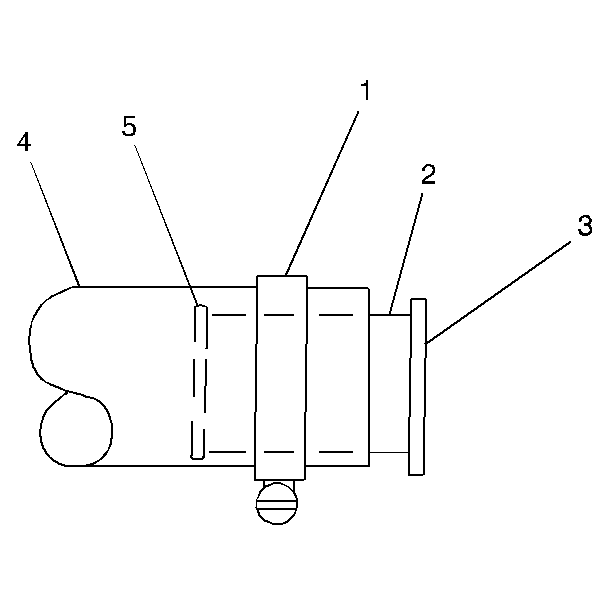
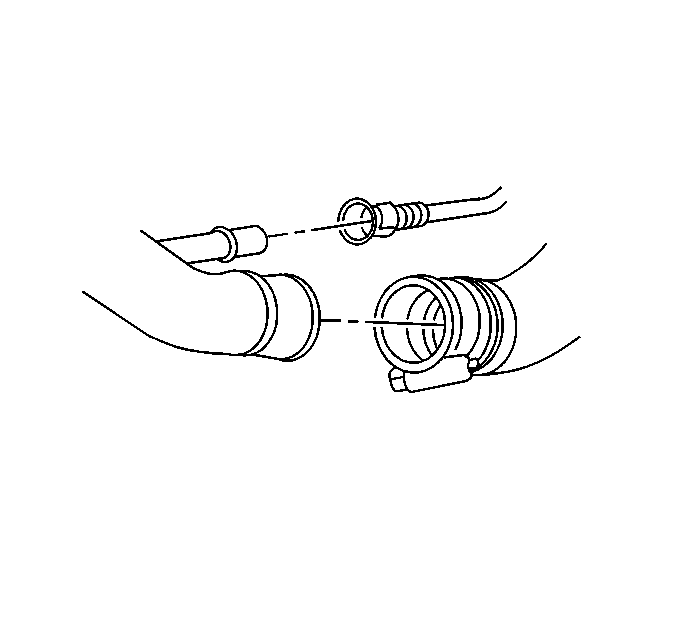
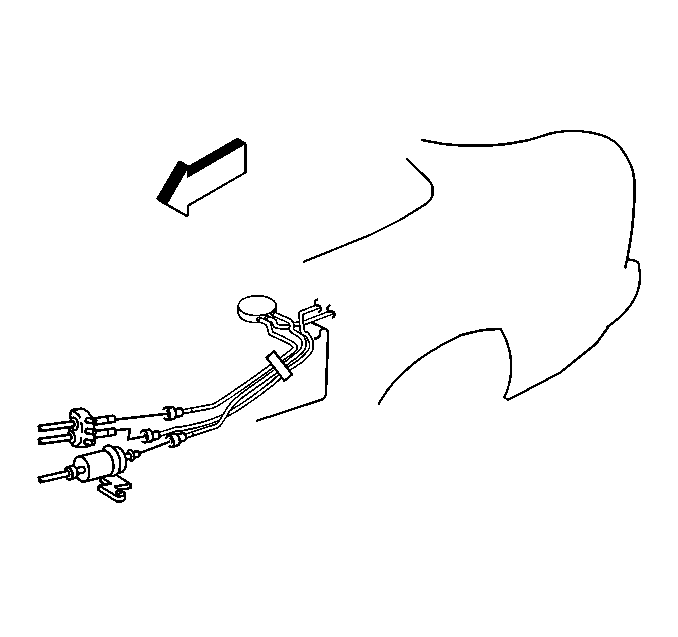
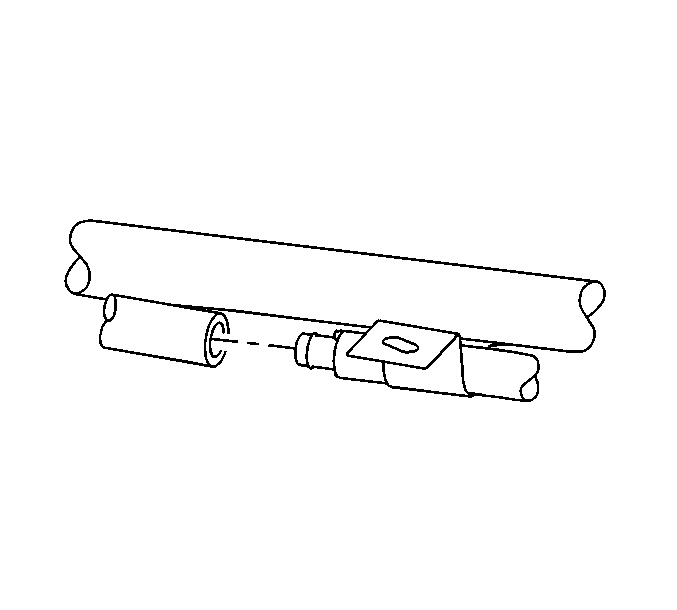
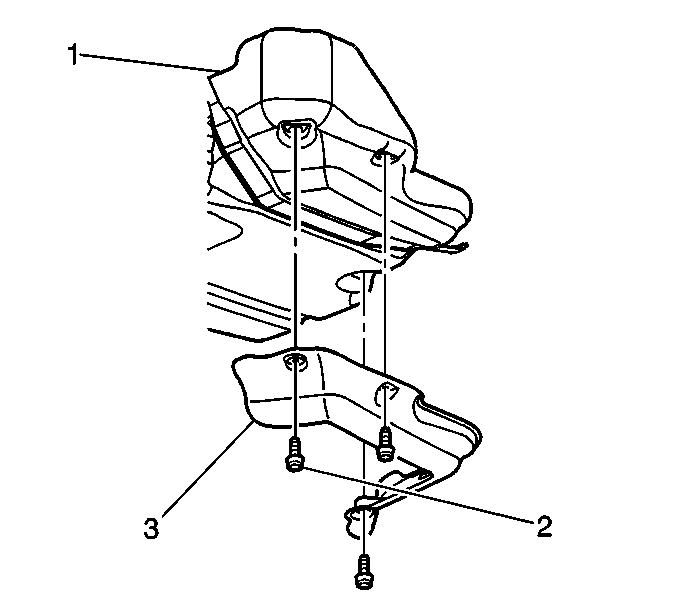
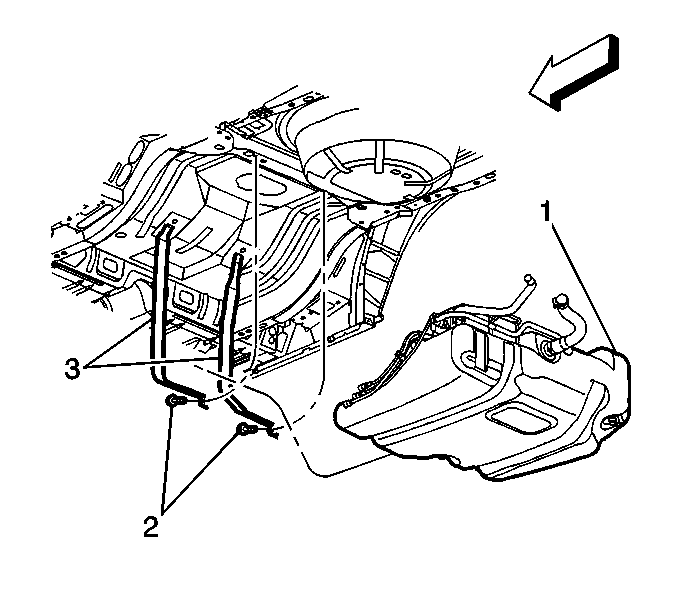
Notice: Do not bend the fuel tank straps as this may damage the straps.
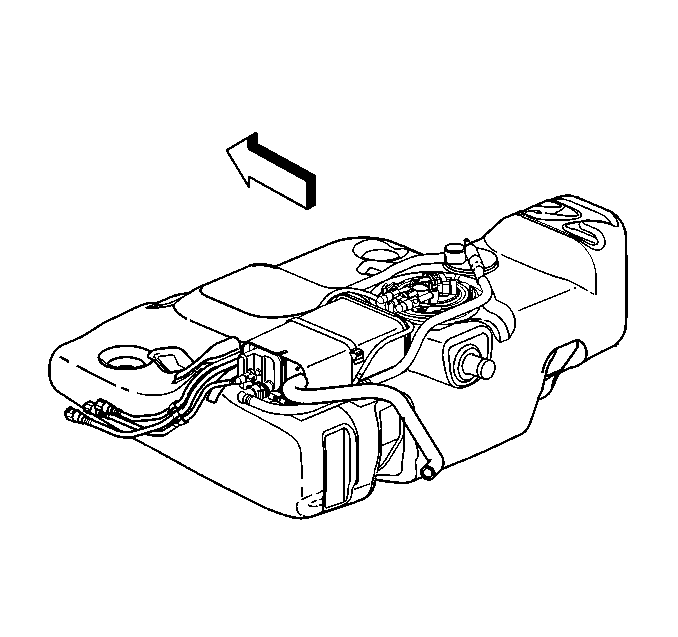
Installation Procedure
- Install the insulator pad on the fuel tank.
- Connect the fuel feed, the fuel return, and the EVAP pipe assemblies and the insulator clips.
- Install the EVAP canister. Refer to Evaporative Emission Canister Replacement .
- With the aid of an assistant, position and support the fuel tank (1).
- Install the bolts (2) to the fuel tank retaining strap (3).
- Position the tank shield (3), and install the three push pins (2).
- Connect the quick-connect fittings at the fuel filter and chassis. Refer to Plastic Collar Quick Connect Fitting Service .
- Connect the EVAP pipe at the front of the fuel tank.
- Connect the fuel tank filler hose to the fuel tank.
- Connect the filler vent pipe at the filler hose/pipe connection.
- Connect the two parts of the EVAP fresh air hose at the splice.
- Fully seat the filler hose (4) on fuel tank port (2).
- Make sure clamp (1) is properly located on tank port between the bead (5) and tank (3).
- Install the rubber exhaust pipe hangers.
- Lower the vehicle.
- Install the fuel sender assembly. Refer to Fuel Sender Assembly Replacement .
- Add fuel and install the fuel filler pipe cap.
- Connect the negative battery cable. Refer to Battery Negative Cable Disconnection and Connection in Engine Electrical.
- Inspect for fuel leaks using the following procedure:

Notice:
• Do not attempt to straighten kinked nylon pipes. Replace any kinked
nylon pipes in order to prevent damage to the vehicle. • Do not attempt to repair sections of nylon pipes. Replace damaged
nylon pipes. • Replace the vapor pipes with original equipment or parts that
meet GM specifications. • Replace the vapor hoses with original equipment or parts meeting
GM specifications. Use only reinforced fuel-resistant hose identified with
the word Fluoroelastomer or GM 6163M on the hose.

Notice: Use the correct fastener in the correct location. Replacement fasteners must be the correct part number for that application. Fasteners requiring replacement or fasteners requiring the use of thread locking compound or sealant are identified in the service procedure. Do not use paints, lubricants, or corrosion inhibitors on fasteners or fastener joint surfaces unless specified. These coatings affect fastener torque and joint clamping force and may damage the fastener. Use the correct tightening sequence and specifications when installing fasteners in order to avoid damage to parts and systems.
Tighten
Tighten the bolts to 48 N·m (35 lb ft).


Notice:
• Do not attempt to straighten kinked nylon pipes. Replace any kinked
nylon pipes in order to prevent damage to the vehicle. • Do not attempt to repair sections of nylon pipes. Replace damaged
nylon pipes. • Replace the vapor pipes with original equipment or parts that
meet GM specifications. • Replace the vapor hoses with original equipment or parts meeting
GM specifications. Use only reinforced fuel-resistant hose identified with
the word Fluoroelastomer or GM 6163M on the hose.



Tighten
Tighten the fuel tank filler pipe hose clamp to 2.5 N·m
(22 lb in).
| 19.1. | Turn ON the ignition, for 2 seconds. |
| 19.2. | Turn OFF the ignition, for 10 seconds. |
| 19.3. | Turn ON the ignition. |
| 19.4. | Inspect for fuel leaks. |
